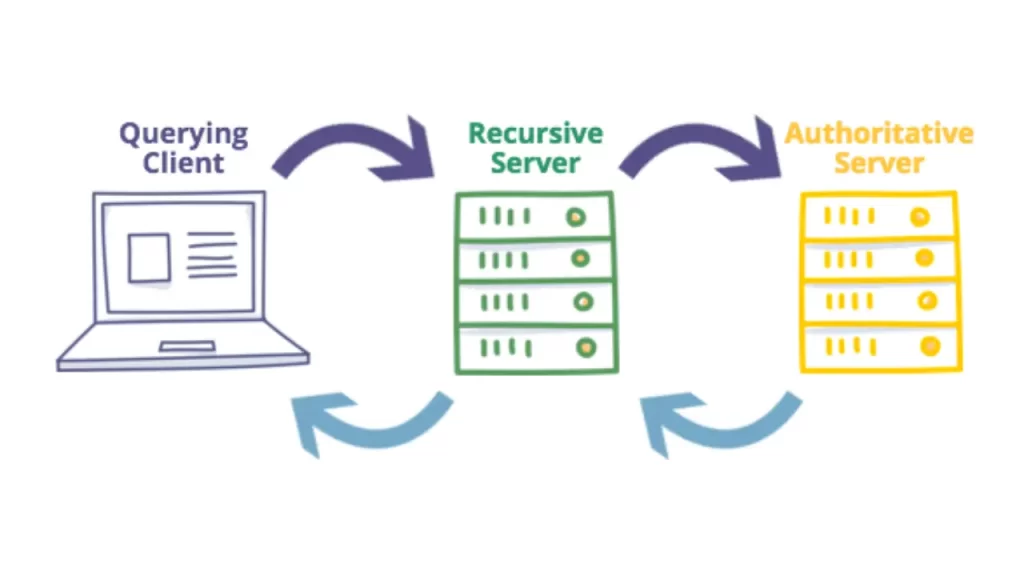In the World Wide Web ecosystem, DNS (Domain Name System) plays a crucial role in translating human-readable domain names into IP addresses that computers can understand. It is like the internet’s address book, translating easy-to-remember domain names into computer-friendly IP addresses. When you type a website name into your browser, DNS helps your device find the correct server that hosts that website. There are two main types of DNS servers – Recursive DNS & Authoritative DNS. Understanding the differences between them is essential for grasping how the internet functions.
Table of Contents
What is Recursive DNS?
Recursive DNS servers are like internet detectives. Your device requests a recursive DNS server whenever you type a web address into your browser. This server then searches for the IP address associated with the domain name you entered. If it doesn’t have the information cached (stored in its memory), it goes on a quest to find the answer. The recursive DNS server starts its journey by asking other DNS servers for help. It might first inquire with the root DNS servers, which know the addresses of all top-level domain (TLD) servers, such as .com or .org. The root server then points the recursive server to the appropriate TLD server. From there, the recursive server asks the TLD server for the IP address of the domain it’s seeking. If the TLD server doesn’t answer, it directs the recursive server to the authoritative DNS server responsible for that domain.
What is Authoritative DNS?
Authoritative DNS servers are the ultimate authorities when it comes to domain names. Each domain on the internet has one or more authoritative DNS servers responsible for storing and providing information about that domain. When a recursive DNS server asks an authoritative DNS server for the IP address associated with a domain name, it expects a definitive answer. Authoritative DNS servers are like librarians who know everything about their assigned books (domains). When they receive a query from a recursive DNS server, they consult their records and provide the requested information. This could be the IP address of a website, the mail server associated with a domain, or any other DNS record relevant to that domain.

Difference Between Recursive DNS & Authoritative DNS
Functioning
- Recursive DNS servers act as middlemen between users and authoritative DNS servers. They handle initial requests for domain information and then chase down the answers if they don’t already have them.
- Authoritative DNS servers are the final word on domain information. They store and provide the official records for specific domains.
Responsibility
- Recursive DNS servers are responsible for finding the IP addresses associated with domain names on behalf of users.
- Authoritative DNS servers are responsible for storing & providing accurate DNS information for specific domains.
Hierarchy
- Recursive DNS servers operate at the top of the DNS hierarchy, interacting with root servers, TLD servers, and authoritative servers to resolve domain names.
- Authoritative DNS servers sit at the bottom of the hierarchy, holding the definitive records for individual domains.
How do they Work?
Recursive DNS Servers
- When you search for something on the internet, your device sends a query to a recursive DNS server.
- The server begins a recursive process of querying other DNS servers if it doesn’t find the IP address. Recursive means repeated.
- Once it obtains the IP address, it caches the information for future use to speed up subsequent requests.
Authoritative DNS Servers
- These servers are responsible for storing and providing DNS information for specific domains.
- When they receive a query from a recursive DNS server, they consult their records and provide the requested information.
- Authoritative DNS servers are updated whenever there are changes to the DNS records of the domains.
Who Uses Recursive DNS?
Internet Users
Your device uses recursive DNS to find the corresponding IP address. Whether you’re checking emails, watching videos, or scrolling through social media – recursive DNS is working behind the scenes to ensure you reach your desired online destinations.
Internet Service Providers (ISPs)
ISPs maintain their recursive DNS servers to handle DNS queries from their customers. These servers help route traffic efficiently across the internet by resolving domain names into IP addresses.
Corporate Networks
Many companies operate their recursive DNS servers within their network infrastructure. These servers help employees access internal resources, websites, and services while maintaining security and control over DNS resolution.
Who Uses Authoritative DNS?
Website Owners
Every website has authoritative DNS servers responsible for storing and providing DNS information for that domain. Website owners or administrators manage these servers to ensure that their websites are accessible to users worldwide.
Domain Registrars
When individuals or organizations register domain names for their websites, domain registrars often provide authoritative DNS services as part of their domain registration packages. They manage the DNS records associated with the registered domains.
Large Organizations
Enterprises, educational institutions, and government agencies typically operate authoritative DNS servers to manage their internal domains and services. These servers help control access to internal resources and maintain the organization’s online presence.
Conclusion
Recursive DNS & Authoritative DNS serve distinct but complementary roles in the internet functioning. Recursive DNS servers act as intermediaries, retrieving information from authoritative DNS servers on behalf of users. Whereas Authoritative DNS servers are the ultimate sources of truth for domain information. Understanding how these two types of DNS servers interact is crucial for comprehending the fundamental workings of the internet. Whether you browse the web, send emails, or access online services – both Recursive & Authoritative DNS servers work to ensure you reach your intended destinations smoothly & promptly.
FAQs
Q1. How does DNS work?
DNS translates domain names (such as google.com) into IP addresses (172.217.12.206), allowing devices to find websites.
Q2. What is the difference between Recursive DNS & Authoritative DNS?
Recursive DNS servers help users find IP addresses by querying other DNS servers – while authoritative DNS servers store and provide DNS information for specific domains.
Q3. Who uses Recursive DNS?
Internet users, ISPs, and corporate networks rely on recursive DNS to translate domain names into IP addresses for accessing websites and online services.
Q4. Who uses Authoritative DNS?
Website owners, domain registrars, and large organizations utilize authoritative DNS to manage DNS records and ensure the accessibility of their domains & services.
Q5. Why is DNS important?
DNS is crucial for accessing websites and online services by translating human-readable domain names into computer-readable IP addresses, enabling seamless internet browsing.
Q6. How are DNS servers maintained?
DNS servers are maintained by various entities, including internet service providers, domain registrars, website owners, and organizations – to ensure the efficient resolution of domain names into IP addresses.

























